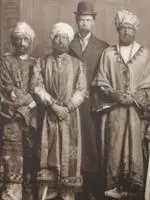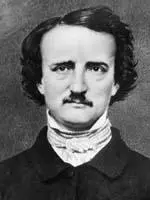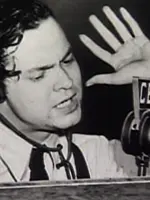Poetry Association of America initiating controversial program Fly-Over Poetry Drones. Watch / listen for us over your house in April!
—Joyce Carol Oates, via Twitter @JoyceCarolOates
While I suppose it's possible the Poetry Association of America is, in fact, all set to deploy an army of rhyming and scheming drones with the purpose of, one can assume, culturing-up this country, it's far more likely the infinitely talented Oates was engaging in the time-honored tradition of literary pranking. She was merely getting a head start on April Fool's Day, or, to put it simply, she was trolling us.
It will probably come as no surprise that authors and trolling have been going hand in hand like high school sweethearts for some time now. I mean, it is basically a writer's job to make up a bunch of lies and sell them truthfully enough that readers suspend their disbelief and go along for the ride, so why shouldn't this facet of their job leak out into their personal lives here and there?
In honor of this troll-iest of troll-y days, let's take a look at some of the greatest literary pranksters history has ever known. Bear in mind, though, I'm not talking about literary hoaxes in which the writers in question hoped no one would ever discover their deceit, but rather writers who were just having a bit of fun (for the former type, check out Cath Murphy's Five Big Fat Literary Fakes).
And now, without further ado...
![]() 1. Virginia Woolf and the Dreadnought Hoax
1. Virginia Woolf and the Dreadnought Hoax
When you think about Virginia Woolf, you probably think of the staid, observational prose of Mrs. Dalloway or To The Lighthouse. Or perhaps you think of the somewhat closed-off, depressed struggling author as depicted in the book/film The Hours. But make no mistake, Woolf liked to get herself into trouble, and engaged in a hoax so epic, Guardian writer John Dugdale called it "one of the [greatest] pranks of the 20th century." Indeed, the "Dreadnought Hoax," as it later came to be called, was quite the proto-troll, involving not just Woolf (then Virginia Stephen), but also her current husband Adrian, future husband Leonard Woolf, and an assortment of writers and artists from the influential Bloomsbury Group of intellectuals in London. According to Wikipedia, the group "had themselves disguised...with skin darkeners and turbans to resemble members of the Abyssinian royal family. The main limitation of the disguises was that the 'royals' could not eat anything or their make-up would be ruined."
Decked out in a fake beard (see photo; she's standing at the far left) and reportedly speaking a gibberish composed of Greek and Latin, Woolf and her fellow pranksters boarded the HMS Dreadnought, which was docked at Portland, Dorset, and proceeded to inspect the ship and its crew (i.e., the Royal Navy). They even presented some of them with fake Abyssinian military honors. The captain of the HMS Dreadnought was in fact hoax co-orchestrator Adrian Stephens's cousin, though he failed to recognize him.
After the prank was unveiled, the Royal Navy wanted those responsible caned, but as the group had not broken any laws, the matter remained a slight embarrassment for the military. But perhaps the greatest impact of the Dreadnought hoax was this: the group's exclamation of approval was the never-before-heard phrase "Bunga Bunga!" So there you have it folks: Virginia Woolf, one of the most critically respected writers of the 20th century, helped to coin the term "Bunga Bunga!"
![]() 2. Joseph D'Lacey Eaten by a Zombie
2. Joseph D'Lacey Eaten by a Zombie
We already reported on this merry little prank about a year and a half ago, but to recap: Joseph D'Lacey, author of horror novels Meat and Black Feathers, was reading a selection of his then most recent book Blood Fugue (about zombies) before a small crowd in a London bookstore. Another author, Jasper Bark, became ill during the reading, and collapsed on the stage, where he proceeded to turn into a zombie and kill D'Lacey. Of course, no one actually died that night, as the whole thing was just a fun hoax (zombies aren't real, did you know?).
This event was barely mentioned in news outlets at the time (we wrote about, there was a press release from D'Lacey's publisher Salt, and some blogger republished our original story), so it's hard to tell if anyone was fooled by the promotional stunt, though if you watch the video, the redhead lady in the yellow shirt at the far left of the screen looks pretty freaked out (the dude in the orange shirt is just laughing though).
![]() 3. Ken Kesey and the Great Smithsonian Prank
3. Ken Kesey and the Great Smithsonian Prank
Speaking of Merry Pranksters, let's talk about Ken Kesey, author of One Flew Over The Cuckoo's Nest and an all-around expert jokester. Kesey allegedly faked his own death too, but that incident doesn't really count as a prank since he hoped to actually get away with it and evade imprisonment for possession of marijuana. No, the grand hoodwinking we'll be looking at today came about two decades after Kesey's staged suicide, when the man was older, wiser, but no less wily.
The whole thing started when representatives from the Smithsonian Institution attempted to obtain his psychedelically-painted bus "Further," which carried his troublemaking group the Merry Pranksters all over America in the 1960s (journeys later chronicled by Tom Wolfe in The Electric Kool Aid Acid Test). According to Wikipedia, Further was in bad disrepair, but the Smithsonian was willing to restore it. However, in a contemporary Seattle Times article, the Smithsonian claims they were never able to reach Kesey directly.
Regardless of who said what and when, Kesey invited several journalists to his farm, where he and a few original Pranksters unveiled a fully restored and operational Further. He told the reporters he had struck a deal and would be personally delivering the bus to the Smithsonian. The Pranksters and journalists then boarded this supposed Further and set out for Washington D.C.
After several days of aimless driving and book promotion, it soon became clear that A.) this bus was not the original Further, but a somewhat close reproduction, and B.) there was no deal with the Smithsonian. In fact, representatives from the institution insisted they were no longer interested in Further, having abandoned any plans to obtain the bus years ago.
The trip to Washington was nothing more than a media stunt designed to make the Smithsonian people look bad. Kesey claimed the reason they "weren't able to reach him directly" was because they never even tried, presumably going behind his back to obtain Further for their collection. For this offense, they and the media "deserved a little pranking."
I'm not sure how effective Kesey's actions were, but at least the event showed that the author still had some tricks up his sleeve long after the Pranksters' heyday was over. As Jeff Barnard, author of the aforementioned Seattle Times article, notes, "Kesey said the spirit of the bus was more important than its body, and the spirit was alive and well."
![]() 4. Edgar Allan Poe and The Balloon-Hoax
4. Edgar Allan Poe and The Balloon-Hoax
The granddaddy of the suspenseful and macabre, Edgar Allan Poe is a well-know influence on Arthur Conan Doyle, Stephen King, Peter Straub, and a host of other horror/crime writers. But you may not know that Poe also inspired one of the most well-known science fiction writers of the 19th century, and did so by fabricating an elaborate hoax in the New York newspaper The Sun.
The story goes, Poe was upset with Sun editor Richard Adam Locke for plagiarizing his short story "The Unparalleled Adventures of One Hans Pfaal," a lesser-know work dealing with a trip to the moon (Locke had taken numerous elements from Poe's story and constructed a fake news story about moon exploration). As a peace offering, Poe was allowed to write a series of articles detailing European balloonist Monck Mason's three-day trip across the Atlantic Ocean in a "lighter-than-air" aircraft.
Presented as a factual account, the story was no more true than the aforementioned moon voyage piece, and was quickly outed as a hoax two days after publication. Though the retraction went unsigned, it is believed Poe himself wrote the brief blurb admitting the paper's leg-pulling.
Though brief, the story did manage to excite fervor among The Sun's dedicated readers, much to Poe's delight. From Wikipedia, quoting Jeffrey Meyers's book Edgar Allan Poe: His Life and Legacy:
Poe himself describes the enthusiasm his story had aroused: he claims that the Sun building was "besieged" by people wanting copies of the newspaper. 'I never witnessed more intense excitement to get possession of a newspaper,' he wrote.
It shouldn't come as a surprise that people were taken in by the erroneous tale: Poe inserted many factual elements into his piece, including the presence on the journey of fellow author and historian William Harrison Ainsworth, and the slightly-tweaked use of the name Monck Mason, a fictionalization of real-life balloonist Thomas Monck Mason.
While the Balloon-Antics is perhaps not one of Poe's most well-known exploits, it does bear a fairly significant footnote: the expedient journey across the Atlantic Ocean was a direct influence on Jules Verne's seminal tale of ballooning adventure Around The World in Eighty-Days. Poe was clearly pleased at the number of people fooled by his articles, but this more concrete literary impression could surely be considered the best result of the prank.
![]() 5. Orson Welles and The War of The Worlds
5. Orson Welles and The War of The Worlds
This prank is so infamous at this point, I wonder if I even need to explain it. But, just in case you are indeed unfamiliar with this epic troll, allow me to elaborate: in 1938, one day before Halloween (another trickster's holiday), the soon-to-be celebrated writer/director of Citizen Kane, Touch of Evil, and numerous other films decided to perform something a little different for his radio show Mercury Theatre on the Air. For that week's literary adaptation, Welles chose The War of the Worlds, H.G. Wells's classic tale of alien invasion, with the twist being that any acknowledgment of this broadcast being staged (announcers identifying the piece's title, author, and players; pausing for station identification or commercial breaks) would be removed; in other words, Welles decided to play the adaptation off as a news broadcast covering an actual alien invasion (though in fact there are two brief announcements about forty and fifty-five minutes into the program, respectively, that identify the performance as a work of fiction, but Welles supposedly timed these in the hopes listeners would miss them).
Now, as Ryan Peverly recently pointed out, we've always been told that Welles's little prank on the susceptible public resulted in mass hysteria, with citizens flooding the phone lines to call their loved ones, power outages, and angry mobs forming to ward off the Martian threat. We've learned, however, that panic might not have been so widespread, that the newspapers over-exaggerated public response to pointedly defame Welles and the medium of radio in general, considering it to be an inferior source of news. This Slate article has more details, but author Jefferson Pooley and Michael Socolow seem bent on defaming Welles themselves, claiming not only that panic was so minuscule it's barely worth mentioning, but also that hardly anyone even heard the broadcast.
As with anything contentious, the truth probably resides at neither extremes (a blip that got blown out of proportion vs. total mass hysteria, dogs and cats sleeping together, etc.), but rather smack in the middle. Regardless, the point is, Welles did set out to hoodwink some people, and he was pleased that he succeeded. Check out the below clip from Welles's apology the day after the incident, called "best performance as an actor" by filmmaker Peter Bogdonavich.
That's the best concealment of a gleeful smirk I've ever seen. Welles really did love to piss people off, and the ire over his prank—combined with the joy of fooling some people—makes him one happy camper.
You can see more of Welles at his troll-y best by watching the entire American Experience episode on The War of The Worlds (the program those Slaters are debunking) here.

About the author
Christopher Shultz writes plays and fiction. His works have appeared at The Inkwell Theatre's Playwrights' Night, and in Pseudopod, Unnerving Magazine, Apex Magazine, freeze frame flash fiction and Grievous Angel, among other places. He has also contributed columns on books and film at LitReactor, The Cinematropolis, and Tor.com. Christopher currently lives in Oklahoma City. More info at christophershultz.com













